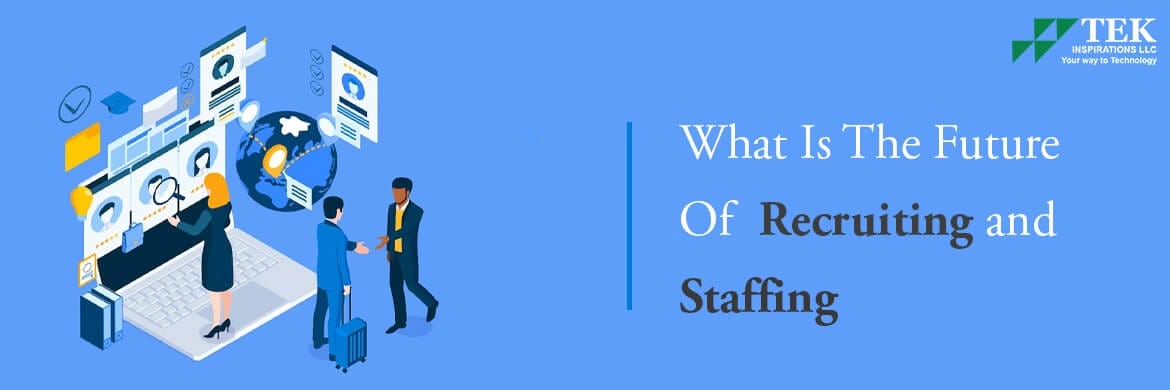
What Is The Future Of Recruiting And Staffing
Recruiting and staffing involve the process of identifying, evaluating, and hiring candidates to fill positions within an organization. Recruiting refers to the process of finding and attracting potential candidates for a job, while staffing refers to the process of selecting and placing the right candidates in the appropriate positions.
Recruiting and staffing can be carried out by internal HR teams or by external recruiting and staffing agencies. Recruitment and staffing professionals are responsible for identifying the staffing needs of an organization, sourcing and evaluating candidates, and coordinating the hiring process.

Recruiting and staffing are important functions for any organization, as the right employees are critical to the success of the business. Effective recruiting and staffing can help organizations to build a strong and skilled workforce and support business growth.
What is the future of Recruiting and Staffing?
The future of recruiting and staffing is likely to be influenced by a number of trends and changes in the way that organizations hire and manage their workforce. Some possible trends that may shape the future of recruiting and staffing include:
- Increased use of technology: The use of technology in recruiting and staffing is likely to continue to grow and evolve. This may include the use of artificial intelligence, machine learning, and automation to streamline the recruitment process and identify top candidates.
- Remote work: The pandemic has accelerated the trend towards remote work, and it is likely that many organizations will continue to support remote work even after the pandemic ends. This may change the way that organizations recruit and manage their workforce, with an increased focus on virtual hiring and onboarding processes.
- Diversity and inclusion: There is likely to be a continued focus on diversity and inclusion in recruiting and staffing, as organizations recognize the importance of having a diverse and inclusive workforce. This may involve the use of targeted recruitment efforts and the adoption of diversity and inclusion initiatives to ensure that all candidates are treated fairly and have equal opportunities.
- Talent development and retention: Organizations may place an increased emphasis on talent development and retention in the future, as they look for ways to build a strong and stable workforce. This may involve the use of training and development programs and employee engagement initiatives to help retain top talent.
There are several benefits of recruiting and staffing for organizations:
- Access to a wider pool of candidates: Recruiting and staffing agencies have access to a wider pool of candidates than an organization may be able to reach on its own. This can increase the chances of finding the right candidates for the job.
- Time and cost savings: Recruiting and staffing agencies handle the time-consuming and resource-intensive process of identifying and evaluating candidates, freeing up HR staff to focus on other tasks. This can save time and cost for the organization.
- Expertise and specialization: Recruitment and staffing professionals have expertise in identifying and evaluating candidates and can bring specialized knowledge and skills to the hiring process.
- Improved quality of hire: Recruitment and staffing agencies can help organizations to identify and hire the best candidates for the job, improving the overall quality of hire.
- Flexibility: Recruiting and staffing agencies can provide a flexible staffing solution, allowing organizations to bring in additional staff as needed to meet changing business needs.
Overall, recruiting and staffing can provide a number of benefits to organizations by helping them to find and hire the best candidates, saving time and cost, and providing access to expertise and specialization.

Why Recruiting and Staffing is needed in 2023?
Recruiting and staffing will continue to be important in 2023 and beyond as organizations look to build and maintain a strong and skilled workforce. There are several reasons why recruiting and staffing will remain a critical function in the coming years:
- Talent shortages: In many industries, there is a shortage of qualified candidates to fill open positions. This can make it challenging for organizations to find the right talent to support their business needs. Recruiting and staffing agencies can help organizations to access a wider pool of candidates and find the right talent for the job.
- Changes in the workforce: The workforce is constantly changing and evolving, and organizations will need to adapt to these changes in order to remain competitive. Recruiting and staffing agencies can help organizations to identify and hire the best candidates to meet their current and future needs.
- Increased use of technology: The use of technology in the workplace is likely to continue to grow and evolve, and organizations will need to hire employees with the skills and expertise to support these changes. Recruiting and staffing agencies can help organizations to identify and hire the right candidates with the appropriate skills and expertise.
Overall, recruiting and staffing will continue to be important in 2023 and beyond as organizations look to build and maintain a strong and skilled workforce to meet the changing needs of the business.
Also, Read More:- Recruiters Need To Know About Seasonal Hiring


One Comment
The Future Of Recruiting: Trends And Strategies In 2023 - TEK Inspirations LLC
January 9, 2023[…] Intelligence and Machine Learning have been instrumental in streamlining the recruiting process. In 2023, their impact is set to grow even further. AI-powered tools can help HR […]